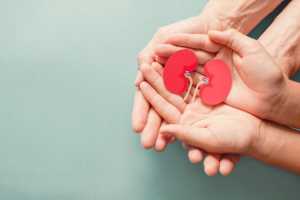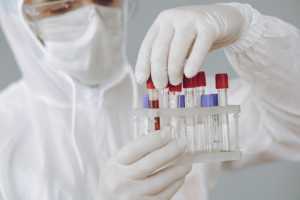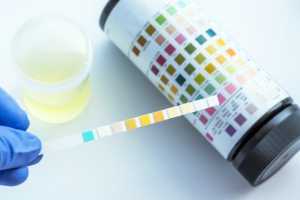Kidney Function Test- Types, Procedure, Cost, And FAQ
Kidneys are located on each side of the spine, underneath the rib cage. These bean-shaped organs play a key role in the functioning of our body, such as removing toxins and waste products, controlling acid-base balance, maintaining water levels, and controlling blood pressure. Besides all these functions, kidneys are also essential for the production of-
- Hormones that regulate blood pressure
- Red blood cells (RBC)
- Vitamin D
But if your doctor thinks that your kidneys are not functioning properly, then you need to undergo a kidney function test or renal function test. The doctor will conduct a simple blood and urine test to identify what ails your kidney. You may also need to undergo a kidney function test if you have high blood pressure or diabetes.
Symptoms Of Kidney Problems
- High blood pressure
- Painful urination
- Frequent urge for urination
- Blood in urine
- Urinary hesitancy
- Swelling of hands and feet
Having a single symptom doesn’t indicate a serious problem, but when the symptoms occur simultaneously, then the kidneys might not be functioning properly.

What Is Included In A Kidney Function Test?
You will be asked to undergo a set of tests that can assess your Glomerular filtration rate. It is the measurement used to determine the functioning of your kidneys.
Serum Creatinine Test
Creatinine is a chemical waste product of creatine. Creatine is an amino acid found in our muscles. This blood test is performed to measure the level of creatinine in our blood. Our kidneys normally eliminate creatinine from the body. By measuring the creatinine level in the blood, doctors can check the functioning of the kidney. If the level of creatinine in your blood is high, then it indicates that the kidney is not functioning properly. To check any problem with the functioning of your kidney, the serum creatinine test is performed along with other tests such as-
- Basic metabolic panel test
- Blood urea nitrogen test
- Comprehensive metabolic panel test
You will be asked to undergo a serum creatinine test, to measure the level of creatinine, if you show signs and symptoms of kidney disease such as-
- High blood pressure
- Swelling in abdomen, wrists, face or ankle
- Nausea and vomiting
- Changes in urine output and frequency
- Trouble falling asleep
- Fatigue and loss of appetite
Creatinine is normally measured in mg/dL or milligrams per deciliter of blood. The results of serum creatinine tests vary depending on gender and age.
In men, the range of normal creatinine level in the blood is 0.9-1.3mg/dL, whereas, in women who are 18 to 60 years old, the range of normal creatinine level in the blood is 0.6-1.1mg/dL.
Creatinine levels higher than 1.4mg/dL in men and 1.2mg/dL in women indicate an anomaly in the normal pattern which might be a problem.
Below is the creatinine levels chart which indicate the normal creatinine for man, women, teenager and toddler in blood and urine samples.

There are many reasons for an elevated level of serum creatinine in your blood. They are-
- Dehydration
- Urinary tract obstruction
- High-protein diet
- Kidney infection
- Reduced blood flow to the kidney
Blood Urea Nitrogen Test Or BUN Test
The liver breaks down protein and creates a waste product known as Urea nitrogen in the liver. The blood urea nitrogen test is performed to measure the level of blood urea nitrogen in the blood. Urea nitrogen is normally filtered out by the kidneys and is removed from the body through urination. By measuring the urea nitrogen level in the blood, doctors can determine how well your kidneys are working. When the liver or kidney is damaged, the level of BUN in the blood will increase. Elevated levels of urea nitrogen indicate liver or kidney problems.
For proper diagnosis, a BUN test is often done with a KFT test, such as a creatinine blood test.
The medical conditions that can be diagnosed by a Blood Urea Nitrogen test include-
- Congestive heart failure
- Urinary tract obstruction(UTO)
- Bleeding in the digestive tract
- Liver damage
- Malnutrition
A blood urea nitrogen test is also used to check the effectiveness of dialysis treatment in patients.
Urea nitrogen is normally measured in mg/dL or milligrams per deciliter of blood. The results of the BUN test vary depending on gender and age.
The range of normal BUN level in the blood is-
Men: 8-24mg/dL
Women: 6-21mg/dL
Children: 7-20mg/dL
High level of blood urea nitrogen indicates-
- Kidney failure
- Kidney disease
- Congestive heart failure
- Heart disease
- Gastrointestinal bleeding
- Obstruction in the urinary tract
Low level of Blood urea nitrogen indicates-
- Protein deficiency
- Liver failure
- Malnutrition
- Overhydration

Urinalysis
It is a test of your urine, which is performed to diagnose a broad range of disorders, like diabetes, urinary tract infection, liver disease, kidney disease, etc. These disorders may affect how the body eliminates toxin and waste products from the body. The main organs that are involved in this are kidneys, lungs, bladder, and the urinary tract. A problem that affects any of these organs can affect the concentration, appearance, and content of the urine.
Urinalysis is mainly done to-
Diagnose a medical condition– You will be asked to undergo urinalysis if you show symptoms such as-
- Painful urination
- Blood in urine
- Abdominal pain
- Back pain
The test helps diagnose the underlying cause of these symptoms.
Check your overall health– You have to undergo urinalysis as part of pre-surgery preparation, routine medical exam, and pregnancy checkup.
Monitor a medical condition– You need to undergo urinalysis if you have been diagnosed with medical conditions such as urinary tract disease, or kidney disease so that your doctor can monitor your medical condition as well as the treatment.
Your urine sample will be evaluated through a visual exam and a microscopic exam.

Visual Exam
The urine will be examined by the lab technician. Normally, the urine appears to be clear. But if the urine appears to be cloudy with an unusual odour, it indicates an infection.
Microscopic Exam
A sample of urine is observed under the microscope. Further testing will be required if any of the following are found in high levels such as-
- Red blood cells- Indicates blood disorder, kidney disease, or bladder cancer.
- White blood cells- Indicates infection.
- Casts- Indicates kidney disorders
- Crystals- Indicates kidney stone
- Yeast or bacteria- Indicates infection
Estimated Glomerular Filtration Rate Test
Glomerulus or Glomeruli is a network of blood vessels that filters the blood to form urine. The glomerulus won’t filter properly if the kidney is not functioning properly. If you undergo an estimated GFR test, doctors can determine how well your kidneys are working. If you have symptoms of kidney disease, then your doctor may ask you to take the estimated GFR test. Signs and symptoms of kidney disease are-
- Mid-back pain
- Unexplained body swelling
- Difficulty in passing urine
- Foamy urine
You need to take the estimated GFR test if you have medical conditions such as-
- Hypertension
- Recurrent urinary tract infection
- Diabetes
- Polycystic kidney disease
- Kidney stone
- Renal failure
- Blood in urine
- Heart disease
The estimated GFR test is a blood test, and there is no special preparation required prior to the test. If the level of GFR is low, then your kidneys will have more damage. There are five main stages of kidney damage. They are-
Stage 1- If the GFR is 90ml/min or above, then it indicates that there is no loss of kidney function.
Stage 2- If the GFR is between 60ml/min to 89ml/min, it indicates that there is mild loss of kidney function.
Stage 3- If the GFR is between 30ml/min to 59ml/min, it indicates that there is a moderate loss of kidney function.
Stage 4- If the GFR is between 15ml/min to 29ml/min, it indicates that there is a severe loss of kidney function.
Stage 5- If the GFR is 15ml/min or below, then it indicates that there is kidney failure.
You’ll be asked to undergo an estimated GFR test by your doctor, for several months, to establish a pattern.
How Are The Tests Performed?
The KFT test requires a blood sample and a 24-hour urine sample.
Blood Sample
Both serum creatinine tests and blood urea nitrogen tests require blood samples. The healthcare professional will tie an elastic band around your arm and cleanse the area with rubbing alcohol. The healthcare professional will insert a small needle into your vein to draw a sample of blood. The blood will be collected in a vial or test tube, and it will be sent to the lab for analysis.
24-Hour Urine Sample
It is a non-invasive and simple test that gives your doctor an idea about the amount of creatinine expelled by your body per day. You will be given a container to collect the urine for 24 hours. You have to urinate the first time into the toilet when you wake up. For the rest of the day and night, start collecting the urine, from the second time you urinate, until the morning of the second day. Make sure that you refrigerate and label the container during the test. When you complete the 24-hour collection process, you can return the urine sample to the laboratory.

Facts About Kidney
- People are born with two kidneys, and even if one kidney is taken out, we can survive. The remaining kidney will perform 75% of the functions and will continue to sustain our body.
- Kidneys are capable of producing vitamin D. Vitamin D is primarily produced by the skin as a response to exposure to sunlight. If the skin fails to do so, then the duty falls to the liver. If the liver fails to do so, then the kidney will take over that function.
- Nephrons are the filtering units of our kidneys. Each kidney has more than 1 million nephrons. If it is placed end to end, Nephron covers a distance of 8 kilometres.
- Your kidneys are lopsided or asymmetrical. Kidneys are located on each side of the spine, right below the rib cage. The left kidney is larger than the smaller kidney and it is positioned a bit higher than the right kidney.
- If a child is born with one kidney, then that kidney will develop and have a weight of 2 kidneys, when the child grows up.
- Every day, our kidney filters about 180 litres of blood. Every minute, the kidney filters 1200 mL of blood.
Frequently Asked Questions(FAQs)
What is Creatinine?
Creatinine is a waste produced by creatine. Creatine is an amino acid found in our muscles.
What Color Is Urine When Your Kidneys Are Failing?
Our kidneys produce urine. Therefore the colour of urine will change when your kidneys fail, and the colour of the urine can be red, brown, or purple.
How To Lower Creatinine?
Creatinine levels can be lowered by reducing vigorous exercise, reducing protein intake, increasing fibre intake, taking chitosan supplements, etc.
What Level Of Creatinine Indicates Kidney Failure?
Creatinine level, which is 2mg/dL or more in children and 5mg/dL indicates kidney failure.
What Is Blood Urea Normal Range India?
Generally, around 6 to 20 mg/dL is considered as the normal range of blood urea. Urea nitrogen is normally measured in mg/dL or milligrams per deciliter of blood.
How Do You Know If Something Is Wrong With Your Kidneys?
You will have symptoms such as changes in urine output and its frequency, blood in urine, discolouration of urine, painful urination, swelling of various body parts, fatigue, mid-back pain, joint or bone pain, and other symptoms.
What Is A Normal BUN To Creatinine Ratio?
A BUN to creatinine ratio is calculated to ascertain the cause of high levels of blood urea nitrogen and creatinine. The ratio is between 10:1 and 20:1.
How Much Does The Kidney Function Test Cost?
The average KFT test cost is around Rs 252. The starting price is Rs 130 and can go up to Rs 500.
What Is Included In A Kidney Function Test?
It is a set of tests that includes a Blood Urea nitrogen test, serum creatinine test, estimated glomerular filtration test, and urinalysis.
Through a timely check of your kidneys, you can get rid of the problems that may put you at risk. But at the same time, a slight delay can cause a lot of problems. Here comes the importance of the Kidney function test. Undergoing a kidney function test is vital for your present and future well-being.